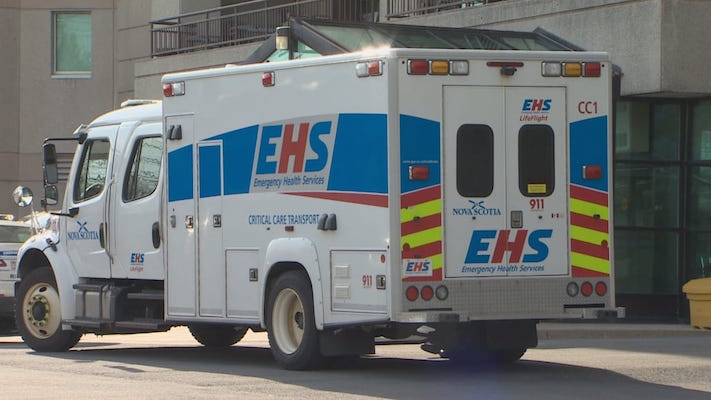Bob Dylan didn’t need a weatherman to know which way the wind blows. And Nova Scotians don’t need a consultant to tell us our Emergency Health Services are a mess. Do we really even need one to tell us how to fix it?

“Last week the government issued a tender for a system-design review of Emergency Health Services. The minister said after 25 years in its current form he thought it was time for a review to ensure the system continues to follow best practices…”
CBC News
Aug 8, 2018
“Helping improve emergency services for over three decades. At Fitch & Associates, we’re dedicated to one thing: Our clients’ success. We put that dedication to the test every time we answer the phone. Every time we get on a plane or shake a hand. Every time we sit down and just listen. And every single time we deliver a recommendation. You see, we know that when we help organizations improve the quality of services, decrease response times or strengthen their financial structure, we’re helping them make a difference in people’s lives. It’s why we come to work every day. And it’s incredibly rewarding…”
“Making sure there’s an ambulance available to respond to a 911 call, no matter where help is needed in Nova Scotia, has become a minute-by-minute challenge for Emergency Health Services dispatchers… A month ago, the province hired Fitch and Associates, a U.S.-based consulting firm to review the current EHS model and provide recommendations “for the most efficient, effective and sustainable EMS system in Nova Scotia for the next 10 to 15 years.” The $145,000 contract calls for a final report by Dec. 28, 2018.”
CBC News
Nov. 22, 2018
“Delorey said he is also waiting on a review of the current EHS model that is now expected sometime in the spring.”
Canadian Press
Jan. 31, 2019
“Nova Scotia paramedics are being so overworked it’s become a public safety issue for the province, their union told a legislature committee Thursday… Meanwhile, a U.S.-based consulting firm is expected to present its review of the current EHS model to the Health Department this spring.”
CTV News
March 14, 2019
“Nova Scotia’s Health Minister has ordered a review into the circumstances surrounding the death in hospital of an Annapolis Valley man as he waited for an ambulance transfer… Mr. Delorey said … he’s looking forward to receiving the final report from Fitch and Associates when it is finished.”
Globe and Mail
Aug 27, 2019
“Despite being due last December, Health Minister Randy Delorey still cannot say when the public will get to see an independent review of the province’s ambulance system. The report… finally landed on the minister’s desk last month.”
CBC News
Nov 7, 2019
It seems like we’re always waiting for yet another consultant’s report into yet another mess our government would rather not own on its own. And if we’re not waiting for an actual report or government document, we’re waiting for government snippers and clippers to cleanse the material of so-called proprietary information so we can see whatever limited, useless information our betters choose to share with us.
Can you say P3?
Often, we wait in vain.
Can you say Yarmouth ferry?
This week the report in question is the much-delayed system-design review of Emergency Health Services. The government finally has it — nearly a year after it was due — and Delorey’s minions are busy studying it in private, presumably taking out the interesting, important bits so we can then see what’s left. If anything at all.

When Health Minister Randy Delorey announced plans for the study back in August 2018, he made the point that, “after 25 years in its current form, he thought it was time for a review to ensure the system continues to follow best practices.”
It actually hasn’t been quite 25 years since the last review. The last such report, Performance Evaluation of Nova Scotia Emergency Health Services, was submitted in 2001. It was largely laudatory, and it was prepared by the same US consultants — Fitch and Associates — to which the government awarded the current much overdue contract.
There was also a June 2007 report by the province’s auditor general, which wondered aloud why the government had never actually exercised its right to conduct a value-for-money audit of the service provided by the private company that runs the province’s ambulance services under contract, even though “most of the financial risk related to the provision of ambulance services remains with the government.”
That report also noted what has — 10 years later — become the elephant in the emergency services room: “ambulance redeployment due to delays in Halifax emergency departments affected communities as far as Bridgewater, Oxford, and Yarmouth… We concluded that [the ambulance service] is subject to an increased risk of not being able to respond effectively to emergency situations due to unavailability of ambulances during these time periods.”
Then is still now. Only worse. The system is now coping — or not — with almost twice as many emergency calls (170,000 versus 90,000) each year.
But perhaps reminding Delorey of those previous door-stop dust collectors that didn’t change much is beside the point.
Just as asking a consultant to produce a serious “system-design review” report on the state of emergency health services in a province in just three months was — and is — wildly, impossibly optimistic.
On the other hand, if we don’t need a weatherman to tell us which way the wind blows, we certainly don’t need another consultant to tell us our Emergency Health Services system isn’t working as it should. And we don’t need another consultant’s report either to tell us the real issue is much bigger than just emergency services.
All we need to do is read the news.
In October 2018, the same month the government commissioned Fitch and Associates to look into emergency services, the CBC published the results of its own investigation into ambulance offload delays.
It found significant delays. And that they were getting worse. After Delorey was appointed health minister in June 2018, in fact, the CBC filed a freedom of information request for his welcome-to-your-new-job briefing notes. They were not upbeat.
According to the government’s own standards, patients arriving by ambulance at an ER should be transferred into the care of hospital staff within 20 minutes 90 per cent of the time. “The two largest hospitals,” the CBC’s report on the briefing note goes on to explain, “only meet the mark between 10 and 17 per cent of the time. At Dartmouth General, 12 per cent of offloads take more than three hours, while nine per cent of offloads at the Halifax Infirmary stretch to that mark or longer.”
But the real issue, the CBC found, was — and is — systemic. And its tentacles extend beyond ambulances and emergency rooms into the whole health care system. The CBC again:
When the problem [of over-crowded ERs] is bad, it can mean patients in the hallway, waiting for rooms, said Dr. David Petrie, the senior medical director of Dalhousie’s emergency medical program of care.
“That’s the hardest thing as providers, I think, is being in that tough situation of knowing there’s a sick person in the hallway, but also knowing there’s a sick person in our beds. And which one do we move? How do we get them in quicker?” he said.
“That’s what our nurses, our paramedics and the docs struggle with almost every day.” …
Trying to solve the problem requires looking at two issues, Petrie said: system efficiency and capacity.
And while efforts are always being made to improve efficiency, he said that can only go so far when it comes to the bigger challenge of balancing demand with capacity in the emergency system.
“At some point, we have to recognize that no matter how efficient you are, if we simply do not have enough beds in the system, there will be backups in the system that will manifest as wait times and ambulance offload times.”
Will a disconnected consultant tell us what to do next?
Will the government actually do what the report suggests?
Might we have done better by empowering our people on the front lines — the ones who best understand the issues — to come up with solutions.
And then actually following through.
Oh, and that report by Fitch and Associates. Will they be held to account for being almost a year late? The CBC:
Delorey said he’s not aware of any penalties Fitch will face for being late delivering the report, but NDP health critic Tammy Martin said there needs to be accountability.
“If you hired somebody to put a roof on your house and they’re 10 months late, you know, I would hope that they would be held accountable,” she said in a phone interview.
“We’re talking about health care and ambulance services to the people of Nova Scotia. Somebody needs to be held accountable and the government is responsible to hold this firm accountable.”
And, perhaps more important, to be accountable itself.
This column first appeared in the Halifax Examiner November 12, 2019.




 STEPHEN KIMBER, a Professor of Journalism at the University of King's College in Halifax and co-founder of its MFA in Creative Nonfiction Program, is an award-winning writer, editor and broadcaster. He is the author of two novels and eight non-fiction books. Buy his books
STEPHEN KIMBER, a Professor of Journalism at the University of King's College in Halifax and co-founder of its MFA in Creative Nonfiction Program, is an award-winning writer, editor and broadcaster. He is the author of two novels and eight non-fiction books. Buy his books